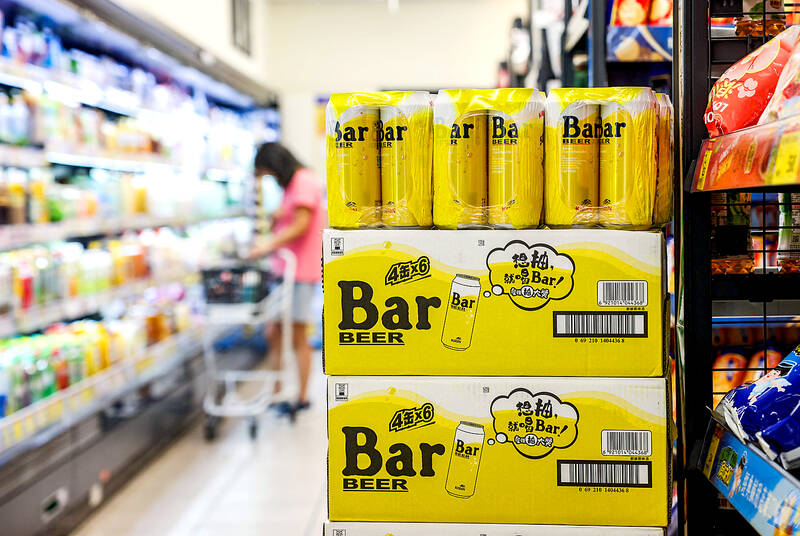The Ministry of Finance yesterday said that it would slap anti-dumping duties on Chinese-made beer and hot-rolled steel for four months from Thursday next week, claiming “substantial damage” to Taiwan’s industry.
The finance ministry in a statement said that it and the Ministry of Economic Affairs “have preliminarily determined that there is dumping [of these products] and it has caused substantial damage to domestic industry.”
The finance ministry said that the duties would be imposed for four months to “prevent our industry from continuing to suffer damage during the investigation.”

Photo: I-Hwa Cheng, AFP
The levies on Chinese-made beer would range from 13.13 percent to 64.14 percent, while for steel they would be either 16.9 percent or 20.15 percent, it said.
The finance ministry in March launched anti-dumping probes into Chinese-made beer and some steel products following complaints of unfair competition.
Taiwan has anti-dumping duties on 10 products, including eight from China, which is its largest trading partner, official data showed.
China was the biggest source of beer imports to Taiwan last year, with shipments topping US$125 million, Bloomberg News reported.
The nation was also looking at whether low prices of certain Chinese hot-rolled steel products resulting from “long-standing overcapacity” in manufacturing were harming domestic players, the finance ministry said.
Taiwan has become the biggest export destination of Chinese beer brewers, which seized more than 70 percent of the nation’s beer market in the first quarter of this year, Democratic Progressive Party (DPP) Legislator Hsu Fu-kuei (徐富癸) told a news conference yesterday.
Over the past five years, Chinese beer makers have exported more than NT$16 billion (US$548.32 million) worth of products to Taiwan, Hsu said.
Chinese suppliers have caused damage to domestic beer makers and the consequences would be dire if the government does not take anti-dumping measures, he added.
Local beer companies have seen their market share slide 20 percent, with production falling 15 percent, DPP Legislator Chung Chia-pin (鍾佳濱) said, adding that that led to about 30 percent decline in utilization.
That indicated that Chinese beer suppliers have severely damaged local beer companies’ businesses, he said.
About 70 percent of Taiwanese supported the government’s measure to levy anti-dumping tax on Chinese beer makers to safeguard the market order, DPP Legislator Kuo Kuo-wen (郭國文) said, citing an unspecified public opinion poll.

The Central Election Commission has amended election and recall regulations to require elected office candidates to provide proof that they have no Chinese citizenship, a Cabinet report said. The commission on Oct. 29 last year revised the Measures for the Permission of Family-based Residence, Long-term Residence and Settlement of People from the Mainland Area in the Taiwan Area (大陸地區人民在台灣地區依親居留長期居留或定居許可辦法), the Executive Yuan said in a report it submitted to the legislature for review. The revision requires Chinese citizens applying for permanent residency to submit notarial documents showing that they have lost their Chinese household record and have renounced — or have never

A magnitude 5.6 earthquake struck off the coast of Yilan County at 12:37pm today, with clear shaking felt across much of northern Taiwan. There were no immediate reports of damage. The epicenter of the quake was 16.9km east-southeast of Yilan County Hall offshore at a depth of 66.8km, Central Weather Administration (CWA) data showed. The maximum intensity registered at a 4 in Yilan County’s Nanao Township (南澳) on Taiwan’s seven-tier scale. Other parts of Yilan, as well as certain areas of Hualien County, Taipei, New Taipei City, Taoyuan, Hsinchu County, Taichung and Miaoli County, recorded intensities of 3. Residents of Yilan County and Taipei received

Taiwan has secured another breakthrough in fruit exports, with jujubes, dragon fruit and lychees approved for shipment to the EU, the Ministry of Agriculture said yesterday. The Animal and Plant Health Inspection Agency on Thursday received formal notification of the approval from the EU, the ministry said, adding that the decision was expected to expand Taiwanese fruit producers’ access to high-end European markets. Taiwan exported 126 tonnes of lychees last year, valued at US$1.48 million, with Japan accounting for 102 tonnes. Other export destinations included New Zealand, Hong Kong, the US and Australia, ministry data showed. Jujube exports totaled 103 tonnes, valued at

BIG SPENDERS: Foreign investors bought the most Taiwan equities since 2005, signaling confidence that an AI boom would continue to benefit chipmakers Taiwan Semiconductor Manufacturing Co’s (TSMC, 台積電) market capitalization swelled to US$2 trillion for the first time following a 4.25 percent rally in its American depositary receipts (ADR) overnight, putting the world’s biggest contract chipmaker sixth on the list of the world’s biggest companies by market capitalization, just behind Amazon.com Inc. The site CompaniesMarketcap.com ranked TSMC ahead of Saudi Aramco and Meta Platforms Inc. The Taiwanese company’s ADRs on Tuesday surged to US$385.75 on the New York Stock Exchange, as strong demand for artificial intelligence (AI) applications led to chip supply constraints and boost revenue growth to record-breaking levels. Each TSMC ADR represents